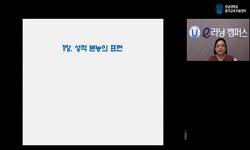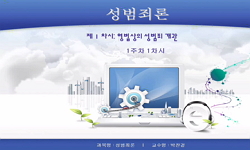In the East Asian thought tradition, it is understood that all things between heaven and earth are made up of ‘qi(氣)’. Human beings are those who respond to other human beings, animals, nature, and the heaven. Yulgok Yi Yi (1536-1584) wrote a nu...
http://chineseinput.net/에서 pinyin(병음)방식으로 중국어를 변환할 수 있습니다.
변환된 중국어를 복사하여 사용하시면 됩니다.
- 中文 을 입력하시려면 zhongwen을 입력하시고 space를누르시면됩니다.
- 北京 을 입력하시려면 beijing을 입력하시고 space를 누르시면 됩니다.
https://www.riss.kr/link?id=A107896092
- 저자
- 발행기관
- 학술지명
- 권호사항
-
발행연도
2021
-
작성언어
-
- 주제어
-
KDC
100
-
등재정보
KCI등재
-
자료형태
학술저널
-
수록면
5-31(27쪽)
-
KCI 피인용횟수
0
- DOI식별코드
- 제공처
-
0
상세조회 -
0
다운로드
부가정보
다국어 초록 (Multilingual Abstract)
The saint’s sincerity((誠) changes humans and the world, but there are exceptional humans who give up moral values. Even with the utmost efforts of virtuous human beings in history, good meaning may not succeed when encountering an unexpected event. On the contrary, there are times when it seems that a person without virtue controls the world only by power. However, it seems that such anomalies do not last long. Yulgok also admits that if people prays earnestly sometimes that prayer would be responded by the heaven and get benefits from it.
Yulgok says that it is sincerity that makes humans responded to others, ghosts, and heaven. It seems that the degree of resonance may be deep and shallow in proportion to the purity of sincerity. According to Yulgok, human beings develop virtues through self cultivation, and when they acquire the virtues of sincerity, they make humans and the world positively respond and contribute to the harmony of the world. Of course, depending on the times, human virtues may not be able to get a proper response when the situation becomes worse due to the unexpected event. However, Yulgok generally recognizes that human best efforts would bring about positive change and harmony in the world and he emphasizes doing the best.
In the East Asian thought tradition, it is understood that all things between heaven and earth are made up of ‘qi(氣)’. Human beings are those who respond to other human beings, animals, nature, and the heaven. Yulgok Yi Yi (1536-1584) wrote a number of writings on the theme of resonance(感應). He argues that there are resonance phenomena not only between humans, but also between humans and the heaven, and between humans and nature. According to Yulgok, humans and heavens respond to each other, and in general, heaven responds to human virtuous behavior with good results, and to bad behavior with bad results. However, in the case of a chaotic period, it seems that the heavenly response to human good and evil may not be correct. Yulgok says that ‘disasters’ (災異) may appear or disappear naturally depending on how humans do politics. He thinks that if the monarch politicizes according to virtue, the natural order would be in harmony in response, and on the other hand, if the politics does not go along the way, nature would lose harmony and disaster may take place.
The saint’s sincerity((誠) changes humans and the world, but there are exceptional humans who give up moral values. Even with the utmost efforts of virtuous human beings in history, good meaning may not succeed when encountering an unexpected event. On the contrary, there are times when it seems that a person without virtue controls the world only by power. However, it seems that such anomalies do not last long. Yulgok also admits that if people prays earnestly sometimes that prayer would be responded by the heaven and get benefits from it.
Yulgok says that it is sincerity that makes humans responded to others, ghosts, and heaven. It seems that the degree of resonance may be deep and shallow in proportion to the purity of sincerity. According to Yulgok, human beings develop virtues through self cultivation, and when they acquire the virtues of sincerity, they make humans and the world positively respond and contribute to the harmony of the world. Of course, depending on the times, human virtues may not be able to get a proper response when the situation becomes worse due to the unexpected event. However, Yulgok generally recognizes that human best efforts would bring about positive change and harmony in the world and he emphasizes doing the best.
참고문헌 (Reference)
1 "栗谷全書"
2 이상익, "현대문명과 유교적 성찰" 심산 2018
3 김희정, "중국 고대 感應觀의 형성" 한국동양철학회 (26) : 79-98, 2006
4 이현선, "신유학의 감응론을 통해 본 ‘소통’의 가능성" 한국윤리학회 4 (4): 2015
5 김희정, "몸·국가·우주 하나를 꿈꾸다" 궁리 2008
6 정우진, "감응의 철학" 소나무 2016
7 이천승, "陰陽感應을 통해 본 儒敎의 자연과 인간에 대한 이해" 동양철학연구회 (54) : 105-129, 2008
8 정해왕, "董仲舒의 天人感應說과 그 政治性" 동양문화연구원 16 : 185-220, 2013
9 김동민, "董仲舒 春秋學의 天人感應論에 대한 고찰- 祥瑞災異說을 중심으로-" 동양철학연구회 (36) : 313-348, 2004
10 "管子"
1 "栗谷全書"
2 이상익, "현대문명과 유교적 성찰" 심산 2018
3 김희정, "중국 고대 感應觀의 형성" 한국동양철학회 (26) : 79-98, 2006
4 이현선, "신유학의 감응론을 통해 본 ‘소통’의 가능성" 한국윤리학회 4 (4): 2015
5 김희정, "몸·국가·우주 하나를 꿈꾸다" 궁리 2008
6 정우진, "감응의 철학" 소나무 2016
7 이천승, "陰陽感應을 통해 본 儒敎의 자연과 인간에 대한 이해" 동양철학연구회 (54) : 105-129, 2008
8 정해왕, "董仲舒의 天人感應說과 그 政治性" 동양문화연구원 16 : 185-220, 2013
9 김동민, "董仲舒 春秋學의 天人感應論에 대한 고찰- 祥瑞災異說을 중심으로-" 동양철학연구회 (36) : 313-348, 2004
10 "管子"
11 "尙書"
12 "孟子"
13 "國譯 栗谷全書(Ⅴ)" 한국정신문화연구원 1985
14 "國譯 栗谷全書(Ⅳ)" 한국정신문화연구원 1996
15 "周易"
16 "中庸"
동일학술지(권/호) 다른 논문
-
- (사)율곡연구원
- 진상훈 ( Jin Sang Hun )
- 2021
- KCI등재
-
- (사)율곡연구원
- 최재목 ( Choi Jae Mok )
- 2021
- KCI등재
-
- (사)율곡연구원
- 이승율 ( Lee Sung Ryule )
- 2021
- KCI등재
-
‘心卽理’ 명제와 율곡 ‘心是氣論’의 대응 - 지각설과 격물설을 중심으로 -
- (사)율곡연구원
- 채희도 ( Chae Hee Doh )
- 2021
- KCI등재
분석정보
인용정보 인용지수 설명보기
학술지 이력
| 연월일 | 이력구분 | 이력상세 | 등재구분 |
|---|---|---|---|
| 2022 | 평가예정 | 재인증평가 신청대상 (재인증) | |
| 2019-01-01 | 평가 | 등재학술지 유지 (계속평가) |  |
| 2016-01-01 | 평가 | 등재학술지 선정 (계속평가) |  |
| 2015-01-01 | 평가 | 등재후보학술지 유지 (계속평가) |  |
| 2013-01-01 | 평가 | 등재후보 1차 PASS (등재후보1차) |  |
| 2012-01-01 | 평가 | 등재후보학술지 유지 (기타) |  |
| 2011-01-01 | 평가 | 등재후보학술지 유지 (등재후보2차) |  |
| 2010-06-23 | 학술지명변경 | 한글명 : 율곡사상연구 -> 율곡학연구외국어명 : 미등록 -> JOURNAL OF YULGOK-STUDIES |  |
| 2010-01-01 | 평가 | 등재후보 1차 PASS (등재후보1차) |  |
| 2008-01-01 | 평가 | 등재후보학술지 선정 (신규평가) |  |
학술지 인용정보
| 기준연도 | WOS-KCI 통합IF(2년) | KCIF(2년) | KCIF(3년) |
|---|---|---|---|
| 2016 | 0.57 | 0.57 | 0.55 |
| KCIF(4년) | KCIF(5년) | 중심성지수(3년) | 즉시성지수 |
| 0.49 | 0.47 | 1.667 | 0.11 |




 KCI
KCI KISS
KISS






